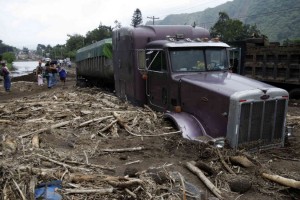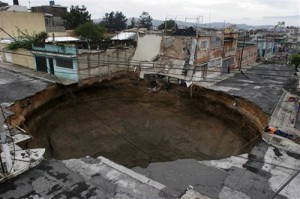 Editor: This article is courtesy of Frank, a consultant from Phoenix who was doing mission work in Guatemala last week when a volcano erupted. Two days later tropical storm Agatha hit, devastating the country.
Editor: This article is courtesy of Frank, a consultant from Phoenix who was doing mission work in Guatemala last week when a volcano erupted. Two days later tropical storm Agatha hit, devastating the country.
Last week I mentioned that in the midst of a power outage and a tropical storm, our little “crisis” took an unexpected turn. About 8:30 pm I heard a knock on the front door. It was odd, not just because it was raining cats and dogs, but because the neighborhood was somewhat isolated.
I cautiously answered it and was surprised to find the young man who normally delivers fruits and vegetables from the local market standing in the rain. He explained that the road to his home had been destroyed by a mudslide, and wondered if he could take shelter with me. I thought about it for a moment and then decided the only thing I could do was let him in.
Of course I didn’t realize that what he was really asking was whether his entire family could take shelter. As I opened the door and peered out into the storm, I saw a tiny little pickup truck with a dozen people packed into it. There must have been three generations of his family in that pickup truck, and one by one they filed through the front door, each of them completed drenched.
While I was contemplating the scene, my mind was racing. How could I host 12 strangers when my own house was flooded and I had no electricity? We were struggling to make dinner for our own kids. I also worried about security; other than delivering high quality vegetables whenever I wanted them, I didn’t know this guy, let alone his grandmother, mother, sisters, brother and a few other people I never figured out.
But…they were already inside, and outside it looked like God had sent me a message to build an ark and it had gotten lost in my spam filter. In the light provided by 15 cell phones (you got that, 15 cell phones for 12 people?), I surveyed the crowd. They didn’t look all that dangerous. I decided to give them the grand entryway and the garage, along with access to a bathroom. The women were thrilled at this announcement and within seconds there was a line forming.
We sized up everyone and got them warm clothes while my wife began working on soup. Twenty minutes later she was serving up “Survival Soup”, a concoction of rice, chicken broth and a bunch of vegetables. We pulled a few sheets off beds, stripped all the couches and chairs of cushions, and set them up the best we could.
My own family and the other missionaries had gone to bed early. They were sleeping in beds that were islands in their own rooms, with the water standing throughout the house. I was having a hard time getting to sleep and beginning to worry about just how long the visitors might remain. To be honest, we weren’t really very well prepared to take care of ourselves.
I felt I had done the right thing by giving them shelter, but in my mind I was wondering how long simple things like toilet paper would last. I also began to wonder just how long we would have fresh water. The property had its own well, but it occurred to me the pump ran on electricity. Even if it was solar powered, there wasn’t going to be much sun for the next few days or so.
As I laid there in bed, my mind was racing. I was thinking how ill prepared I really was and wondering how much worse it really could be. I determined when I returned home to Phoenix that I would revisit all of my emergency preparedness plans, including plans to take on friends, family or acquaintances who would inevitably show up in the event of a crisis.

A sinkhole created by tropical storm Agatha covers a street intersection in downtown of Guatemala City.
The electricity eventually came on after about 72 hours, and life quickly got back to normal (for us anyway, although many thousands of people were homeless and hundreds dead). I’m now back in Phoenix living my “normal” life, commuting to the office and worrying about things like the battery going out on my garage door opener and the filter on the pool not working quite as well as I’d like. I haven’t forgotten about my experience in Guatemala, and how quickly things here in America might descend into chaos when a nation that has largely never experienced real suffering is faced with catastrophe—be it natural, economic or terrorist in origin.
One of the greatest lessons I learned from the event was that it is vital to test your preparedness, and the only real way to do this is to go to the main power box in your home and turn it off. You might as well turn off the cell phones as well and live as though the batteries have run down—just as they would after a few days in a real crisis.
You’ll learn all sorts of things, not the least of which is that it is more psychologically and emotionally taxing to live through a minor crisis than you would anticipate. All the little things—the uncertainty, the lights being off, the cold from the leaking water—they all contribute to an emotional weariness. I can’t tell you how many times I looked at the clock on the electric stove (of course it was blank) or tried to turn on the lights when I walked into a dark room. I can only imagine how much more trying it would be if someone was injured, missing, or there was serious damage to our shelter.
I hope my little story is helpful in some way. As Mr. Heid is always saying, “As Christian Patriots we should hope for the best…but plan for the worst.”
Frank, Phoenix, AZ
If you liked this article you may be interested in this product from our sponsor.

 Off The Grid News Better Ideas For Off The Grid Living
Off The Grid News Better Ideas For Off The Grid Living



